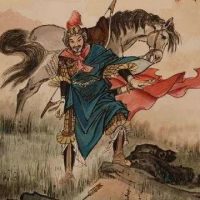Abakhan : The Bear King
Listen
At a glance
| Description | |
|---|---|
| Origin | Khakass Mythology |
| Classification | Spirits |
| Family Members | N/A |
| Region | Russia |
| Associated With | Royalty, Warrior, Protection |
Abakhan
Introduction
In the heart of southern Siberia lies the Republic of Khakassia, a region steeped in myth, where nature and spirit intertwine through the enduring legend of Abakhan. Known interchangeably as Abakan, Abakhan, or Aba Khan, this mythical ancestor and warrior-king stands as a central figure in Khakass mythology, revered as both the progenitor of the Khakas people and the guardian of their lands. The name Abakhan lives on through the Abakan River and the capital city that bears it, symbolizing how myth and geography merge into cultural identity. Rooted in ancient Turkic and shamanistic traditions, the myth of Abakhan represents more than a tale of heroism—it is a narrative of creation, kinship, and the enduring bond between humanity and nature.
In Khakass folklore, Abakhan is not just a distant mythic king but the embodiment of the land’s soul itself. His story has been passed down through oral epics, songs, and shamanic rituals, preserving his essence across centuries. To this day, he remains an emblem of strength, courage, and divine guardianship—values deeply woven into the cultural fabric of the Khakas people.
Physical Traits
Descriptions of Abakhan vary across the oral traditions of Central Asia, but he is consistently portrayed as a towering warrior with bear-like qualities—a reflection of the Khakas reverence for the bear as a sacred totem. The very name “Abakhan” translates roughly to “Bear’s Blood,” suggesting not only lineage but also vitality, power, and the life force of the people. His image combines human and animal traits, a symbolic bridge between the earthly and the spiritual realms.
In artistic depictions and retellings, Abakhan is imagined wearing traditional nomadic armor, his broad shoulders cloaked in furs, riding a powerful horse across the vast Siberian steppe. His association with the bear, a creature respected for both its strength and its wisdom, anchors him as a protector spirit who safeguards his descendants. This imagery resonates deeply with shamanic concepts of transformation and animal kinship, where the line between man and nature is not one of dominance but of coexistence.
Family
Though historical records and myths do not provide explicit details about Abakhan’s family, his genealogical importance as the ancestor of the Khakas and Abakan peoples remains clear. In the oral epics (algysh) of Khakass culture, lineage and ancestry hold sacred significance. Abakhan is often depicted as the father of tribes and the unifier of clans, his spirit living on through the generations that followed.
Some local interpretations also tie Abakhan’s family to other nature spirits—guardians of rivers, lakes, and mountains—suggesting a divine household that oversees the harmony of the natural world. These familial connections reinforce the idea that his legacy is not limited to bloodline but extends to the spiritual kinship between humans and the elements. The Khakas belief system, emphasizing balance and respect for the environment, can thus be traced to Abakhan’s mythic family ties.
Other names
Across the vast expanse of Turkic and Mongolic cultures, Abakhan appears under various names—Aba Khan, Abahan, or Abaxan—each variant preserving the essence of his legend while adapting it to local linguistic traditions. In Turkish and Mongolian folklore, the name is often associated with kingship and divine authority, while in Khakassia, it holds a distinctly ancestral meaning.
Despite regional variations, the underlying symbolism remains consistent: Abakhan is the bear-king, a warrior who embodies the primal forces of nature and the protector of his people. His myth transcends geography, appearing in Turkic creation tales and shamanic chants across Central Asia. This widespread reverence underscores his importance as a shared cultural archetype representing leadership, strength, and unity.
Powers and Abilities
The powers of Abakhan are deeply interwoven with the spiritual landscape of Khakassia. As a divine ancestor, he is believed to command natural elements, particularly water and weather. One of the most enduring legends tells of Abakhan leaping into the Abakan River, sanctifying it with his spirit and transforming it into a life-giving force for the people. From that moment, the river became sacred—a symbol of continuity and protection.
Abakhan’s connection to rainmaking is another recurrent theme in Khakas mythology. Shamans invoked his name during droughts, believing his spirit could summon rain and restore fertility to the land. This power to balance the elements aligns with the shamanic worldview, where ancestral spirits act as intermediaries between the human world and the forces of nature.
Moreover, Abakhan’s association with the bear spirit grants him protective and regenerative powers. In Khakas cosmology, the bear is not merely a symbol of strength—it is a totem of wisdom, renewal, and healing. Abakhan, embodying these traits, represents both the warrior’s might and the healer’s compassion. His myth teaches that true leadership lies in harmony with nature rather than domination over it, a theme that continues to resonate in ecological interpretations of indigenous spirituality today.
Modern Day Influence
The legacy of Abakhan continues to shape the cultural identity and artistic expression of Khakassia. The city of Abakan and the Abakan River stand as living tributes to the myth, ensuring that his memory remains deeply rooted in everyday life. Local traditions, from folk festivals to storytelling gatherings, celebrate Abakhan through songs, dances, and symbolic performances honoring the bear totem.
Artists, writers, and musicians in modern Khakassia often draw inspiration from Abakhan’s story to explore themes of heritage, environmental stewardship, and national identity. Institutions like the Khakass National Museum of Local Lore and the Khakass Research Institute of Language, Literature, and History in Abakan actively preserve and study folklore texts that feature Abakhan, ensuring that oral traditions are not lost to time. Contemporary theater and poetry frequently reinterpret his myth, blending classical motifs with modern sensibilities to express the spiritual resilience of the Khakas people.
In recent years, the resurgence of indigenous spirituality and cultural pride has brought Abakhan back into public consciousness. He is now viewed not only as a mythic ancestor but also as a symbol of ecological balance and the sustainable coexistence between humans and the natural world. The myth of Abakhan has even found digital life through platforms like Mythlok, which explore global mythology and help reintroduce these timeless stories to modern audiences.
In essence, Abakhan endures as more than a legend—he is a living emblem of Khakass identity, nature’s sacredness, and ancestral memory. Through rituals, art, and geography, his presence continues to remind the people of Khakassia that their roots run deep in both myth and the earth itself.
Related Images
Source
Abakhan. (2024, December 1). Wikipedia: The Free Encyclopedia. Retrieved from https://en.wikipedia.org/wiki/Abakhan
Britannica. (2010, January 26). Abakan River. Encyclopædia Britannica. Retrieved from https://www.britannica.com/place/Abakan-River
Encyclopedia.com. (2025, October 15). Siberian Mythology. Retrieved from https://www.encyclopedia.com/history/encyclopedias-almanacs-transcripts-and-maps/siberian-mythology
Anatolian Archaeology. (2024, January 4). Evil Spirits in the Belief of Khakass Turks. Retrieved from http://www.anatolianarchaeology.net/evil-spirits-in-the-belief-of-khakass-turks/
Absolute Siberia. (2015, February 24). Khakassia. Retrieved from https://www.absolute-siberia.com/en/pages/Khakassia.html
Wikipedia. (2003, October 20). Abakan (River). Retrieved from https://en.wikipedia.org/wiki/Abakan_(river)[4]
Encyclopedia.com. (2025, October 5). Khakass. Retrieved from https://www.encyclopedia.com/humanities/encyclopedias-almanacs-transcripts-and-maps/khakass
Ahamkara.org. (1999). Gods and Spirits of Altai Shamanism. Retrieved from https://ahamkara.org/upperworldspirits
Türk, D. (2019). Shamanism and Myth in Central Asia. Central Asian Review, 17(2), 45–62.
Balogh, L. (2015). Bear Totemism in Siberian Cultures. Journal of Ethnology and Folklore, 12(1), 78–91.
Kharitonov, V. (2018). Khakass Epic Poetry and Mythic Heroes. Siberian Studies Quarterly, 23(3), 101–120.
Tishkov, V. (2010). The Mythological Landscape of Siberia. Russian Folklore Review, 8(4), 33–50.
Saryglar, A. (2021). Reviving Indigenous Beliefs in Khakassia. Cultural Heritage Journal, 29(1), 59–74





